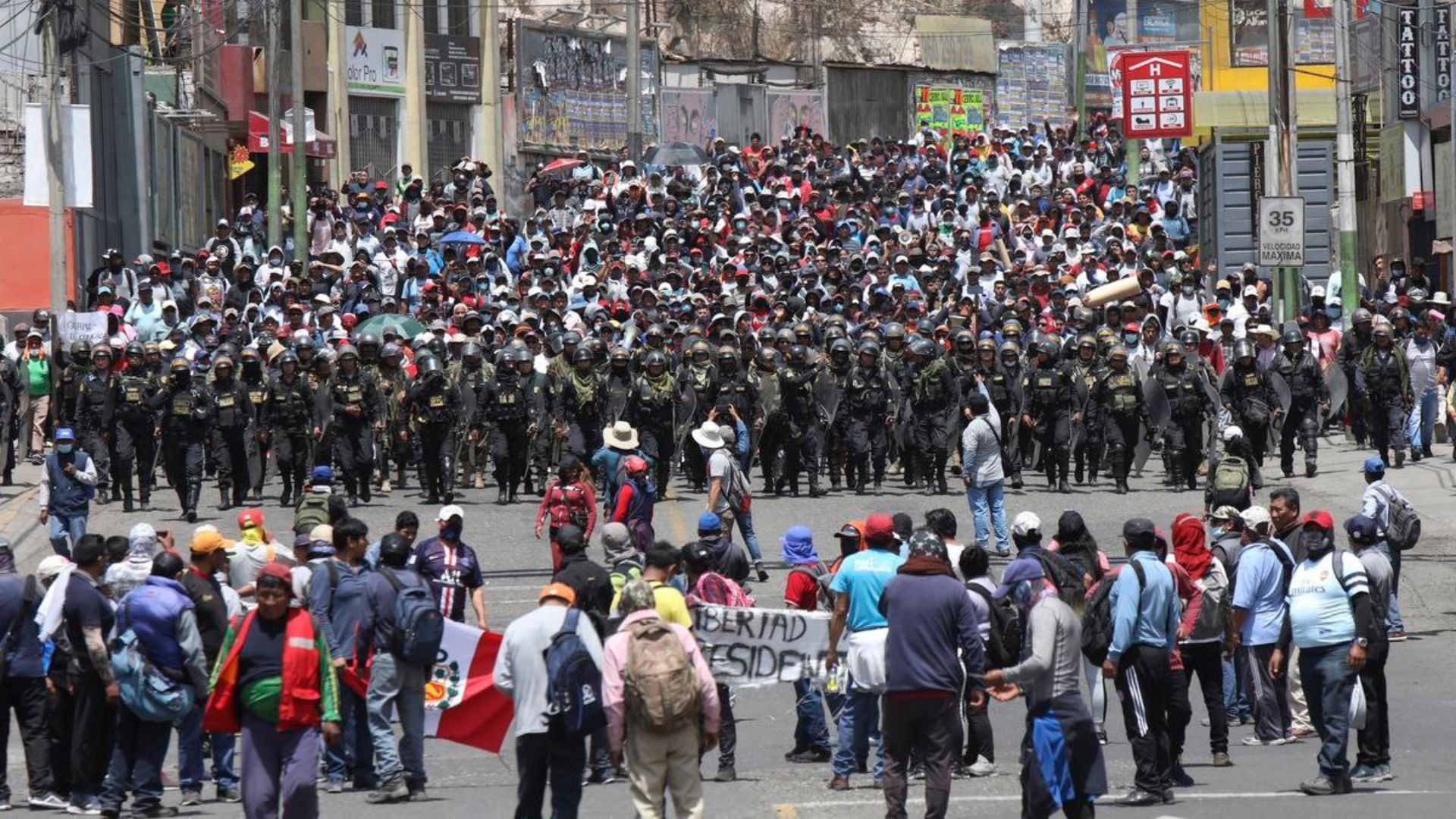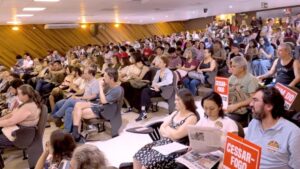
Published 25/01/2023 07:24 | Edited 1/25/2023 5:45 PM
The secretary of Education and Culture of the CGTP (General Confederation of Workers of Peru), Carmela Sifuentes, spoke with the red portal about the protests taking place in Peru and how the movement against Dina Boluarte’s government has grown and is pressing for her resignation.
Since President Pedro Castillo was arrested, and his deputy, Dina Baluarte, took over, voters in the regions where the former president was elected with a majority of votes, began a series of protests for his release and for new elections. However, the government responds with repression and death to the demonstrators. With that, the great mobilizations that arrived in Lima were fermented.

According to Carmela, the struggle of the largest labor union in the country, the CGTP, has been in defense of democracy, especially respect for the popular vote. “We are fighting, not just for our labor rights that Castillo granted us, and that the president wants to take away from us. We are also fighting for democracy, as a vanguard labor force”, said the former president of the CGTP.
Read also: Only international support can end the stalemate in Peru
The trade unionist explains that the “fascist right” lost the elections, “but it has not forgiven that a poor and peasant person could be in power”. According to her, the serious political crisis occurs because the right wants to return to power, “and continue dominating and taking over our natural resources, withdrawing labor rights and ignoring the fundamental rights of freedom of association and collective bargaining”.
In summary, the Peruvian elite does not accept that the people won the elections, which is why they did everything possible to keep Castillo out of power. She refers to the numerous requests for impeachment of the former president made by Congress based on alleged accusations of corruption. “And Mrs Boluarte is totally dominated and captured by that right”.
Unity around democracy
What unifies the country, according to her, is democracy and, above all, respect for the popular vote, against the corruption that is taking place to a greater degree. “The people are tired that their popular vote is not respected and that all regions of Peru are not given importance”, she says, pointing to the serious concentration of wealth in the surroundings of the capital, while the south of the country suffers from the abandonment of power. public.
Read also: Peru and Bolivia start 2023 under coup disturbances
The growth of demonstrations was due to police brutality encouraged by the government. Even more conservative sectors of society, including the media, have been scandalized by the more than 60 murders.
“It’s terrible. Police forces fire without regard to anything. On the other hand, some of the extreme right are included in the mobilizations, and join the police and the government to provoke these disasters and place the blame on the workers. We are mobilizing the whole country, with ups and downs, against this violence by the government, ministers and Congress”, he described.
Claims and dialogue

Castillo’s release is not a priority for the movements. “The priority is that Mrs. Dina Boluarte resigns. That Congress restructure the board of directors to call the elections as soon as possible. And that a correct and fair trial be guaranteed to Mr. Castillo. In defining a new government, that in July of this year a referendum should be called to have a new Constituent Assembly. These are the demands we are demanding in the streets. Around these points, young and humble workers are murdering, for the most part, ”she explained.
Read also: Foro de São Paulo expresses concern about increased repression in Peru
The critical situation has reached the point where an institutional dialogue is no longer proposed. One cannot imagine a dialogue mediated by neighboring countries. Bolivian Evo Morales tried and was criminalized. The Church also tried, but was rejected.
“The dialogue is in the streets. It is one-sided, because the others do not want to lose power, neither in Congress nor in the Ministries, which are backed by the dark forces of Mrs. Keiko Fujimori. The only form of solution is the resignation of the president”, summarized Carmela.
According to her, the CGTP has never opposed a dialogue. “But how to dialogue with this lady, who is not even legitimate as president, in practice, who the people don’t want to see, who has her hands stained with blood? That is why she is demanded to resign immediately and that Congress call elections. The CGTP has already discussed what it could with it, which ignored us. Therefore, the companions of the South do not want dialogue, but a solution through resignation”, she reaffirmed.
Read also: Protests grow across Peru and Boluarte puts the Army in the streets
Unionism in the midst of informality
After the pandemic, informality at work grew from 70%, which is already a level outside the continental average, to 82%. “We need informal workers to join the centrals so that we can find solutions for their organization, because even in the public sector there is informality with different legal regimes”, suggests the unionist.
“Castillo helped us with collective bargaining in the state and public sector, which we had never had before. There was also a decree that placed limits on outsourcing. However, the Ministry of Labor received an agenda with 19 points from the CGTP, which both Congress and the government want to ignore”, she says.
“Castillo, yes, was an option for the workers, despite his political mistakes”, she says, referring to the way he lost support from traditional parties, in a powerful and unicameral Congress. “If it had unified everyone, perhaps what happened would not have happened. But he was, yes, supporting the labor force.”
Read also: Clash with police in Peru leaves 17 dead, so far
the geographical apartheid
The demonstrations in the poorest areas of the country seem to show that indigenous peoples and the majority of workers want to have a voice in a government that insists on focusing its attention on Lima and the regions with the highest concentration of income. As a result, areas with a majority indigenous population end up experiencing a racist apartheid by the State.
According to Carmela, who is president of the CGTP in the Cajamarca region, one of the main problems of these mobilizations has its basis precisely in the dissatisfaction of indigenous communities and peoples of the South, who are deprived of national wealth.
“When we return to peace, we have to pay attention to these most marginalized peoples, indigenous peoples and other forgotten Peruvians,” he said.
Source: vermelho.org.br

